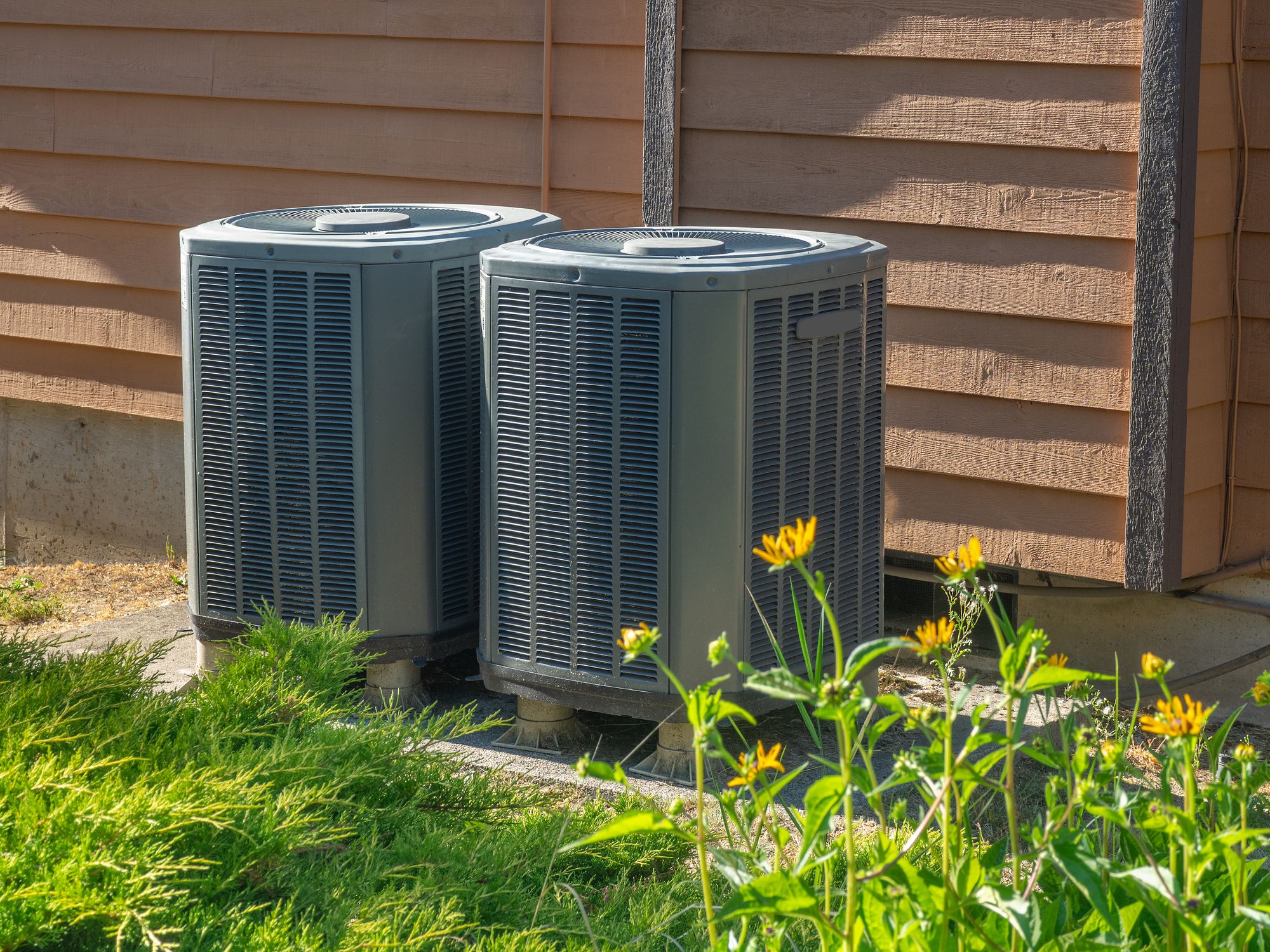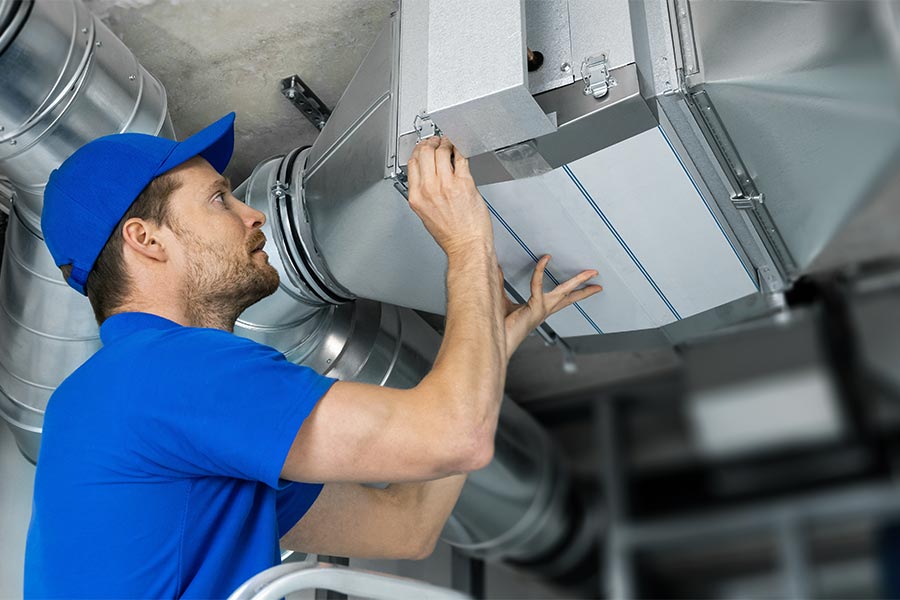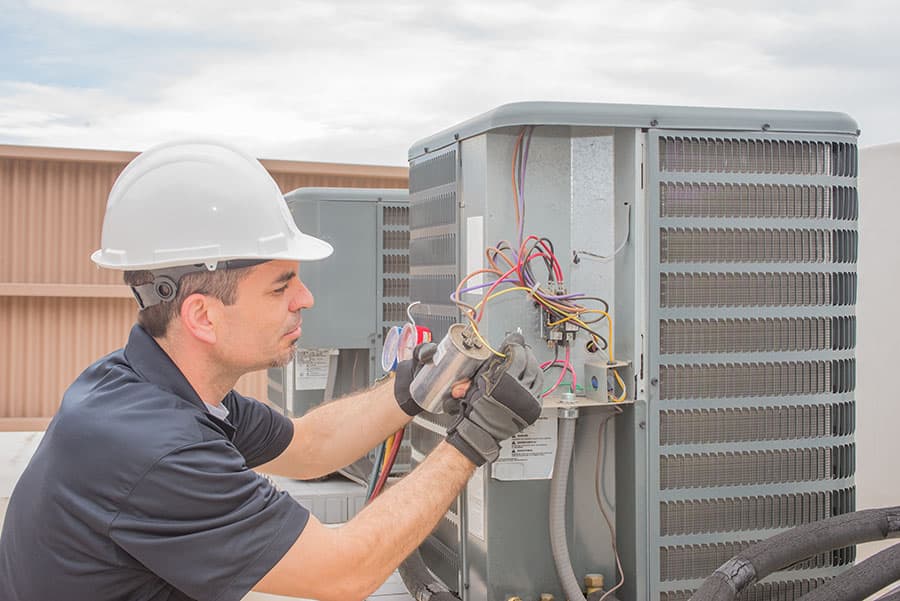Exploring the Crucial Elements of an Efficient HVAC System
An effective heating and cooling system is improved numerous essential elements that function in harmony. Each component, from the thermostat to the ductwork, plays an important duty in keeping comfort and power performance. Understanding these elements is essential for enhancing performance and enhancing indoor air quality. As one analyzes these parts, the elaborate relationships between them disclose insights right into improving general system effectiveness. What particular variables contribute most to this efficiency?
The Duty of the Thermostat in A/c Effectiveness

Frequently neglected, the thermostat plays a crucial role in the efficiency of Heating and cooling systems. This tiny gadget works as the primary nerve center, managing temperature level setups and ensuring suitable comfort within a room. By properly picking up the ambient temperature level, the thermostat connects with the air, air flow, and heating conditioning units to maintain the desired climate
An efficient thermostat minimizes energy usage by triggering the HVAC system just when needed, thus protecting against extreme home heating or air conditioning. Modern programmable and clever thermostats improve this effectiveness better by enabling individuals to establish schedules and remotely adjust setups, adapting to everyday regimens.
Furthermore, the placement of the thermostat is essential; improper area can bring about unreliable temperature readings, leading to inefficient procedure. In general, a well-functioning thermostat not only enhances comfort but likewise contributes significantly to power savings and the long life of the heating and cooling system.
Recognizing the Importance of Air Filters
Air filters serve an important feature in a/c systems by ensuring that the air distributing within a room continues to be tidy and healthy. These filters catch dust, irritants, and various other contaminants, avoiding them from being recirculated throughout the setting. By recording these fragments, air filters add to boosted indoor air quality, which can significantly profit passengers' health and wellness, especially those with allergic reactions or respiratory system problems.
Additionally, maintaining clean air filters improves the effectiveness of cooling and heating systems. Clogged filters can limit airflow, causing the system to work harder to preserve preferred temperatures, causing increased energy usage and higher energy costs. Regularly changing or cleaning up filters is an essential upkeep action that can extend the life expectancy of HVAC devices. Eventually, recognizing the significance of air filters allows homeowners and building supervisors to take aggressive steps to ensure a well-functioning, reliable cooling and heating system that promotes a secure and comfortable indoor setting.

The Performance of the Heating System and Warmth Pump
Heating systems and heat pumps are vital parts of heating and cooling systems, in charge of giving warmth during cooler months. Heaters operate by home heating air with burning or electrical resistance, after that dispersing it throughout the home using air ducts. They generally provide rapid home heating and can be sustained by gas, electrical power, or oil, depending upon the system kind.
Alternatively, heat pumps transfer warm as opposed to generate it. They remove warm from the outdoors air or ground, even in low temperatures, and move it indoors. HVAC experts. This twin performance enables heatpump to likewise provide air conditioning in warmer months, making them flexible options for year-round climate control
Both systems call for correct maintenance to assure efficiency and longevity. While heaters master extreme chilly, warm pumps can be useful in moderate environments. Understanding their distinct performances aids property owners in choosing the most appropriate option for their heating requires.
Exploring the A/c System
The air conditioning system is a crucial element of cooling and heating systems, offered in different types to suit different requirements. Understanding the performance rankings of these blog units is essential for making educated options about energy intake and cost. This section will discover the varied kinds of ac system and clarify exactly how performance scores effect efficiency.
Sorts Of Air Conditioners
While numerous factors influence the choice of air conditioning systems, comprehending the various kinds available is crucial for property owners and structure supervisors alike. Central air conditioning conditioners are designed to cool whole homes or structures, making use of a network of air ducts for air flow. Home window devices provide an even more local option, perfect for solitary areas or tiny rooms. Mobile air conditioning unit supply versatility, allowing individuals to relocate the unit as required. Ductless mini-split systems are another option, combining the performance of main systems with the ease of zoning, as they call for no ductwork. Ultimately, geothermal systems harness the planet's temperature level for energy-efficient cooling. Each kind includes distinctive advantages, making educated options necessary for effective climate control.

Efficiency Ratings Discussed
Understanding effectiveness scores is essential for selecting the best cooling device, as these metrics give understanding right into the system's efficiency and energy consumption. The most typical ranking for ac system is the Seasonal Power Effectiveness Proportion (SEER), which determines the cooling result throughout a typical cooling season separated by the complete electric energy input. A higher SEER indicates far better effectiveness. Furthermore, the Energy Performance Ratio (EER) is utilized for determining effectiveness under certain conditions. One more vital metric is the Energy Star accreditation, which represents that a system satisfies stringent power performance guidelines. By reviewing these rankings, customers can make informed selections that not only maximize comfort however additionally lower energy prices and environmental effect.
The Value of Ductwork and Air flow
Reliable ductwork design and air flow monitoring play essential roles in the general performance and performance of heating and cooling systems. Proper ductwork assurances visit homepage that conditioned air is dispersed equally throughout a space, decreasing temperature fluctuations and improving comfort. Properly designed air ducts minimize resistance to airflow, minimizing the work on HVAC equipment and eventually reducing power usage.
Air flow monitoring entails tactically positioning vents and signs up to boost the circulation of air. This protects against usual issues such as cool or warm places, which can occur when air flow is blocked or improperly balanced. Furthermore, the right duct products and insulation can further improve efficiency by minimizing warmth loss or gain during air transit.
An efficient ductwork system not only adds to energy cost savings but can additionally extend the life-span of heating and cooling devices by lowering unnecessary pressure (HVAC experts). Recognizing the value of ductwork and air movement is crucial for achieving peak Cooling and heating system efficiency.
Normal Upkeep Practices to Improve Efficiency
Regular upkeep techniques are important for making certain peak performance of a/c systems. These methods consist of routine inspections, cleansing, and needed repair work to maintain the system running successfully. On a regular basis changing air filters is vital, as blocked filters can block air movement and decrease efficiency. On top of that, professionals should inspect and clean evaporator and condenser coils to prevent getting too hot and power wastage.
Annual expert inspections are also suggested, as skilled professionals can determine possible issues prior to they escalate. Lubricating moving parts lessens wear find and tear, contributing to a longer life expectancy for the system. Moreover, making certain that the thermostat works correctly aids in preserving suitable temperature control.

Frequently Asked Questions
Just how Often Should I Change My Thermostat?
Thermostats should typically be changed every 5 to one decade, depending upon use and technology developments. Normal checks are suggested to ensure peak efficiency, particularly if experiencing irregular temperature level control or enhanced power costs.
What Size Air Filter Is Best for My HVAC System?
The very best size air filter for a cooling and heating system varies by unit design. Commonly, it's vital to consult the owner's handbook or examine the existing filter measurements to assure peak efficiency and air high quality.
Can I Mount a Warm Pump Myself?
Setting up a heatpump separately is feasible for skilled individuals, but it calls for expertise of electrical systems and regional codes. Employing a professional is advised to guarantee correct installation and perfect system efficiency.
How Do I Know if My Ductwork Is Reliable?
To determine ductwork efficiency, one ought to look for leaks, measure airflow at vents, evaluate insulation top quality, and examine temperature distinctions in between supply and return ducts. Professional analyses can give comprehensive insights into total performance.
What Are Indications My Heating And Cooling Requirements Immediate Maintenance?
Indicators that a cooling and heating system needs immediate upkeep include unusual sounds, inconsistent temperatures, raised energy bills, unpleasant odors, and frequent cycling. Dealing with these concerns immediately can avoid further damage and warranty optimal system efficiency.
Air filters serve a vital function in A/c systems by guaranteeing that the air circulating within a room stays clean and healthy. In addition, preserving tidy air filters improves the effectiveness of A/c systems. Ductless mini-split systems are one more alternative, incorporating the effectiveness of central systems with the ease of zoning, as they require no ductwork. Understanding effectiveness ratings is essential for picking the best air conditioning device, as these metrics provide insight right into the system's efficiency and power consumption. The finest dimension air filter for an A/c system varies by system layout.